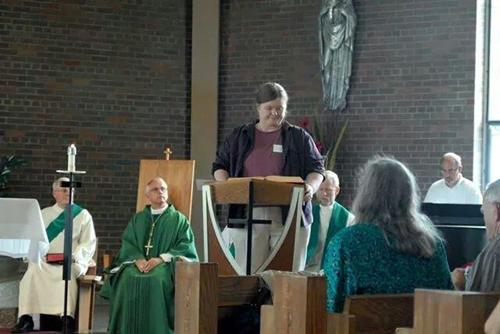Nov. 12, 2014 By Marika Donders I knew quite early on that marriage was not my vocation. In college, I received two marriage proposals. The first time I thought “no, I am not ready.” With the second proposal I had an inkling thought that “no, this is not for me.” When college friends started to get married, I assisted with music for their weddings and was happy to be able to lend my voice to the celebrations. I appreciated the beauty of the Sacrament and loved watching my friends make that commitment of self-gift to each other. Mutual friends who watched the bride and groom get married would ooh and ah over this or that element of the wedding and make notes as to which of these they would incorporate into their weddings when the time came. My reaction was different. Experiencing my friends’ marriages made me realize that yes, this is beautiful, but no, this is not my calling. So I started to explore: If not marriage, then what? I had prayed for vocations to the consecrated life, and started to discern if this was where God might be calling me. After many visits to religious communities, I didn’t seem to belong with any of them. Then I met the Daughters of St. Paul. Here was a community whose charism of evangelization through media made sense to me. On my first visit to their Charleston, SC convent I thought: a Catholic book store with a Blessed Sacrament chapel… what more could anyone want? I spent four years in formation with the community. It was a beautiful time of learning about myself, making life-long friendships, deepening faith and spirituality AND of struggling with my vocation. Although the charism and the spirituality of the community fit, community life was not where God was calling me. It was time to move on. But move on to what? I trusted God had a plan. I had never considered single life a vocation and needed to let go of my preconceived ideas. To me it was a state of life from where you move on to where God calls you. Single life struck me as temporary and the "vocation to the single life" as presented in vocation talks seemed like an afterthought. After leaving the Daughters of St. Paul, I entered a program of study for an MA in Ministry. It was a way to connect with others who were deeply interested in serving the Church as laity. While studying John Paul II’s Theology of the Body, I came to appreciate and understand of the vocation to the single life. John Paul II's teaching did not support the idea of vocation to the single life as such. A person may choose to remain single for very noble purposes, but when the Spirit so moves, there is nothing that would prevent him from following another path, another vocation. So how can single life be a true permanent vocation? It wasn't the same as Marriage, Consecrated Life or Priesthood, each of which is a way to completely and reciprocally give oneself to another for the sake of the kingdom. Yet each of us, including those of us who are single, have a vocation to holiness and to a relationship with Jesus. John Paul II wrote that "no one is without a family in this world: the Church is a family and home for everyone, especially those who 'labor and are heavy laden.' But what of those, like myself, who are single by choice and have discerned a call to remain single in the world for the sake of the kingdom? The option that exists goes back to the beginning of the Church. As Thomas Dubay wrote in his book And You are Christ's: "In the history of the Catholic Church, the first manner in which women pledged their chastity to Christ was in private consecration." This form of life is also supported by a Church Document of Pope Pius XII in his document on Consecrated Virginity: "… it also flourishes among many who are lay people in the full sense: men and women who are not constituted in a public state of perfection and yet by private promise or vow completely abstain from marriage and sexual pleasures, in order to serve their neighbor more freely and to be united with God more easily and more closely." And so I have intentionally chosen to remain single, grappling with a call that many don't even know exists. There is a freedom and availability to go where and when needed to be present as a catalyst within the Body of Christ. In the center of my favorite prayer, the Anima Christi, there is the line: "Within your Wounds, hide me." Hide me in your wounds not for my own safety or that I may be hidden from toil or danger, but rather: I see your wounds. Hide me in your wounds that I may be a healing balm. Mother Mary Francis in her book on the Anima Christi says it best: It is a radical option, to live a life hidden in Christ, yet out in the open, and as all vocations, a life of trust in the infinite love of Christ.
photo by colleen miner
|
||||


